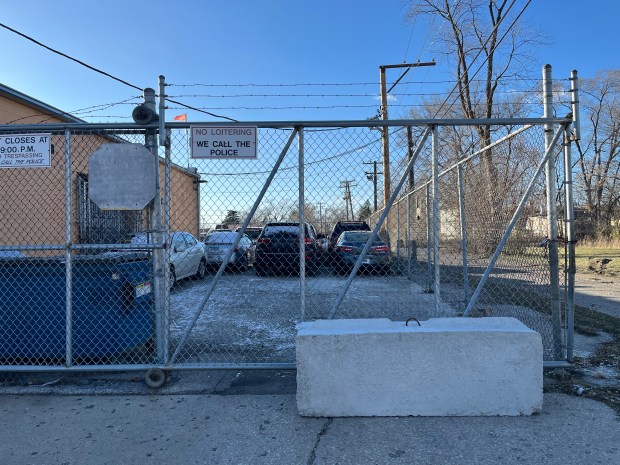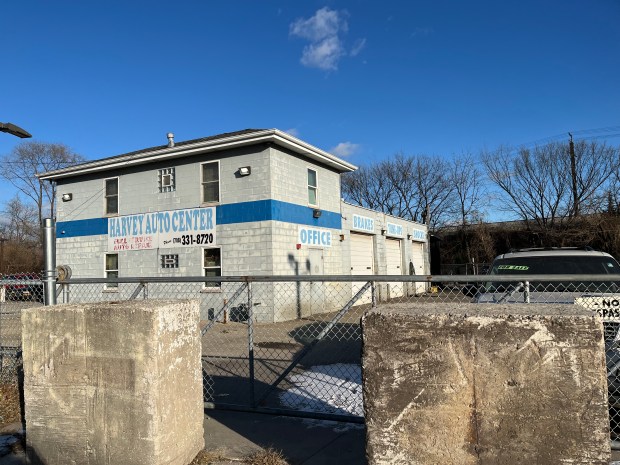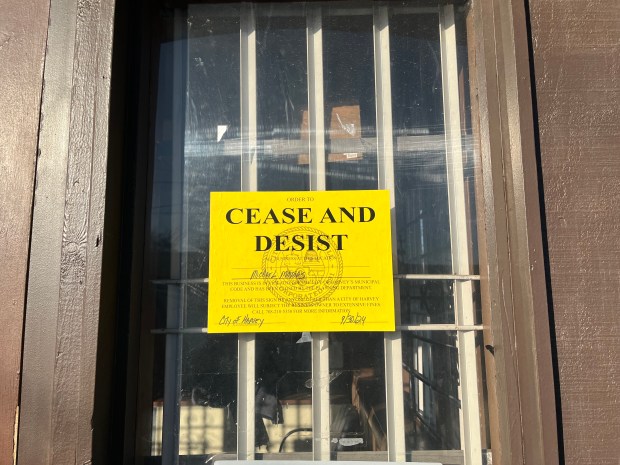Michael Kinsch, owner of a used car lot in Harvey, says his business is several years behind on property taxes, which led the city to deny his business license renewal in April.
Kinsch continued operations until late September, but was forced to cease when the city installed giant concrete barricades, blocking both entrances to his lot.
“I don’t get how they think they’re enriching the community by forcing people out,” Kinsch said. “They’re forcing me out. I cannot leave my inventory there because it will get destroyed.”
Kinsch’s business, Michael Motors, is among 465 businesses the city says are delinquent on their Cook County property taxes, collectively owing more than $12 million in unpaid taxes as of 2023, according to a statement shared by city spokesperson Glenn Harston II.
A city ordinance approved in January allows denying operating licenses to businesses with unpaid property taxes, and Mayor Christopher Clark and his administration have taken steps to enforce the law. That includes offering settlement agreements to help businesses avoid daily fines of up to $2,500, and now placing concrete barricades to prevent unlicensed businesses from operating.
But Kinsch and other business owners say the city’s efforts to collect overdue taxes are driving businesses out of Harvey. With many businesses facing thousands in overdue bills and unable to turn a profit after being forced to close, catching up on back taxes seems an impossible feat.
“Everybody wants a better life, everybody wants to move up the leg of the ladder. And by just working to pay your taxes, what life is that?” Kinsch said.
Miguel Gayton, a manager at Kinsch’s car lot, said Thursday they were moving cars to auction. Kinsch said he can no longer keep his inventory on the lot due to concerns it will be stolen or damaged. Despite ceasing operations, Kinsch said he still pays for overnight security to monitor the lot and prevent theft.
Another business owner, Benecia Gonzalez, owns Harvey Auto Center, an auto repair shop she inherited from her grandfather, along with more than $20,000 in tax debt. She has been pleading her case with the city for months.

Gonzalez appeared in June before the City Council during public comment after her auto shop was ordered to close in May due to her business license being denied for tax delinquency. She was one of many business owners offered a settlement agreement, which would allow them to avoid daily $2,500 fines by paying the city either $2,500 per month totaling $30,000 for the year, two payments of $12,000 totaling $24,000 or a lump sum of $20,000.
Clark previously told the Southtown these funds do not go toward outstanding property taxes, but instead go directly to the city in the form of a fine.
“You’re paying a fine in lieu of prosecution,” he said. “We cannot collect property taxes.”
Now, Gonzalez’s shop is one of many barricaded in September.

Harston said the city would not comment beyond a provided statement, which did not specify how many businesses were blocked by concrete barricades to prevent operations. However, business owners said several small businesses, as well as national retailers such as Dollar General and O’Reilly Auto Parts, were barricaded in September for delinquent taxes.
Clark declined to be interviewed, with Harston saying the city has already spoken “extensively” on the topic. Clark previously told the Daily Southtown many of the business owners behind on payments are not residents of Harvey, unfairly avoiding taxes that benefit the city and placing a greater burden on local taxpayers.
“It is unacceptable for these businesses to utilize city services while diverting the revenue meant for Harvey to support infrastructure, public safety and essential services in other communities where they reside,” the city statement reads. “This practice shifts the financial burden onto hardworking Harvey citizens, leaving children and seniors to face ongoing struggles and depriving the community of the resources it desperately needs.”
Rob Hanlon, an attorney with Netzky Olswang Law Group, recently filed a federal lawsuit on behalf of Gonzalez and eight other businesses: Ascevez Auto Services, Atlantic Towing and Motors, auto mechanic Martin Munoz, Harvey Auto Repair Clinic, Los Taquitos Restaurant, Sarabia Auto Repair and Sales, and Shads Liquor and Universal Towing.
The lawsuit calls the city’s efforts a “scheme” to “extort money from business owners under a purported right to collect Cook County real estate taxes, even though that process is delegated by statute to the Cook County Collector and State’s Attorney.”
The case was filed on Nov. 14 and a court date has not yet been scheduled, court records show.
Property taxes are collected by the Cook County treasurer, then distributed to taxing districts such as municipalities, schools, parks and libraries.
Municipalities typically depend on Cook County’s process to issue delinquent notices and, if necessary, sell back taxes at a tax sale to buyers who can then place a lien on the property.
Kinsch said his property tax bill has dramatically increased in recent years as the property was assessed at a much higher value than he believes it’s worth. He often contests these assessments in court through the appeals process.
“I stopped paying (property taxes) years ago because the dollar amount didn’t make sense, and I tried to appeal it,” Kinsch said.
This past summer, reassessments in the south suburbs resulted in shifting much of the tax burden from businesses to homeowners, resulting in record property tax increases the treasurer’s office said disproportionately affected communities of color. Since then, tax collection rates dropped in part due to economic reasons such as inflation as well as the spike in tax bills, the county treasurer’s office found.
Harvey has one of the lowest property tax collection rates, at just 52%, according to the Cook County treasurer’s office. For most residents, between 35% and 40% of their tax bill goes to the city. Under the city’s largest tax code, more than half of all taxable properties in Harvey contribute about 39% of their tax bill to the city, the treasurer’s office said.
However, the use of concrete barricades to block businesses from operating without a license is new, and a method Hanlon said was done outside the proper channels and should have been determined in court.
“There is no due process of law. Government can’t just say, I’m going to start barricading you,” he said. “You got to go to court and get a court order to allow you to do such things.”
The lawsuit also claims that some businesses are being unfairly denied operating licenses for outstanding taxes that they don’t owe, as they are renters.
The city did not comment on whether landlords should be held accountable over renters for tax delinquency, but Clark previously said renters should address overdue taxes with their landlords or take legal action, depending on the terms of their lease agreement.
The county treasurer’s office said that it typically varies case by case, as many lease agreements specify renters are responsible for paying a portion or all of the property taxes, depending on the size of the leased space.
smoilanen@chicagotribune.com





